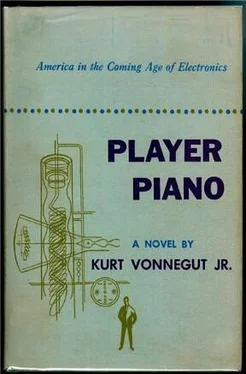"As far as thet goes," Bud was saying, "it wouldn't be much of a trick to replace him with a gadget." Paul had a good idea where Bud's stubby index finger was pointing.
FINNERTY apparently found plenty to entertain himself with in the Ilium Works. He didn't appear in Paul's office until late in the afternoon. When he did arrive, Katharine Finch gave a small cry of surprise. He'd let himself in through two locked doors with keys he'd presumably failed to turn in when he left the plant for Washington years before.
Paul's door was ajar, and he heard the conversation.
"Don't go for your rod, lady. The name's Finnerty."
Katharine did have a gun somewhere in her desk, though no ammunition. That secretaries should be armed was a regulation held over from the old days, too; one Kroner thought well enough of to revive in a directive.
"You're not authorized to have those keys," she said coldly.
"Have you been crying?" said Finnerty.
"I'll see if Doctor Proteus can see you."
"What is there to cry about? See - none of the red lights are on, no buzzers going off, so all's well with the world."
"Send him in, Katharine," called Paul.
Finnerty walked in and sat on the edge of Paul's desk. "What's the matter with Miss Policy out there?"
"Broken engagement. What's on your mind?"
"Thought we'd have a couple of drinks - if you feel like listening."
"All right. Let me call Anita and tell her we'll be late for supper."
Katharine got Anita on the line, and Paul told his wife what he was up to.
"Have you thought out what you'd say to Kroner if he told you Pittsburgh was still open?"
"No - it's been a hell of a day."
"Well, I've been thinking about it, and -"
"Anita, I've got to go."
"All right. I love you."
"I love you , Anita. Goodbye." He looked up at Finnerty. "O.K., let's go." He felt somehow conspiratorial, and got a small lift from the feeling. Being with Finnerty had often had that effect. Finnerty had an air of mysteriousness about him, an implication that he knew of worlds unsuspected by anyone else - a man of unexplained absences and shadowy friends. Actually, Finnerty let Paul in on very little that was surprising, and only gave him the illusion of sharing in mysteries - if, indeed, there were any. The illusion was enough. It filled a need in Paul's life, and he went gladly for a drink with the odd man.
"Is there somewhere I can reach you?" said Katharine.
"No, I'm afraid not," said Paul. He planned to go to the Country Club, where he could be reached easily enough. But, on an impulse, he indulged his appetite for secretiveness.
Finnerty had come over in Paul's station wagon. They left it at the Works and took Paul's old car.
"Across the bridge," said Finnerty.
"I thought we'd go to the club."
"This is Thursday, isn't it? Do the civic managers still have their big dinner there on Thursdays?"
The civic managers were the career administrators who ran the city. They lived on the same side of the river as the managers and engineers of the Ilium Works, but the contact between the two groups was little more than perfunctory and, traditionally, suspicious. The schism, like so many things, dated back to the war, when the economy had, for efficiency's sake, become monolithic. The question had arisen: who was to run it, the bureaucrats, the heads of business and industry, or the military? Business and bureaucracy had stuck together long enough to overwhelm the military and had since then worked side by side, abusively and suspiciously, but, like Kroner and Baer, each unable to do a whole job without the other.
"Not much changes in Ilium," said Paul. "The civic managers will be there all right. But if we get over there this early, we can get a booth in the bar."
"I'd rather share a bed in a leprosarium."
"All right; over the bridge it is. Let me put on something more comfortable." Paul stopped his car just short of the bridge, and traded his coat for the jacket in the trunk.
"I wondered if you still did that. That's even the same jacket, isn't it?"
"Habit."
"What would a psychiatrist say about it?"
"He'd say it was a swat at my old man, who never went anywhere without a Homburg and a double-breasted suit."
"Think he was a bastard?"
"How do I know what my father was? The editor of Who's Who knows about as much as I do. The guy was hardly ever home."
They were driving through Homestead now. Paul suddenly snapped his fingers in recollection and turned down a side street. "I've got to stop by police headquarters for a minute. Mind waiting?"
"What's the trouble?"
"Almost slipped my mind. Somebody swiped the gun from the glove compartment, or it fell out, or something."
"Keep driving."
"It'll just take a minute, I hope."
"I took it."
"You? Why?"
"Had an idea I might want to shoot myself." He said it matter-of-factly. "Even had the barrel in my mouth for a while, and the hammer back - for maybe ten minutes."
"Where is it now?"
"Bottom of the Iroquois somewhere." He licked his lips. "Tasted oil and metal all through dinner. Turn left."
Paul had learned to listen with outward calm when Finnerty spoke of his morbid moments. When he was with Finnerty he liked to pretend that he shared the man's fantastic and alternately brilliant or black inner thoughts - almost as though he were discontent with his own relative tranquility. Finnerty had spoken dispassionately of suicide often; but, seemingly, he did it because he got pleasure from savoring the idea. If he'd felt driven to kill himself, he would have been dead long ago.
"You think I'm insane?" said Finnerty. Apparently he wanted more of a reaction than Paul had given him.
"You're still in touch. I guess that's the test."
"Barely - barely. "
"A psychiatrist could help. There's a good man in Albany."
Finnerty shook his head. "He'd pull me back into the center, and I want to stay as close to the edge as I can without going over. Out on the edge you see all kinds of things you can't see from the center." He nodded. "Big, undreamed-of things - the people on the edge see them first." He laid his hand on Paul's shoulder, and Paul fought a reflex that suddenly made him want to get as far away as possible. "Here's the place we want," said Finnerty. "Park here."
They had circled several blocks and were back at the head of the bridge, by the same saloon Paul had visited for the whisky. Paul, with uncomfortable memories of the place, wanted to go somewhere else, but Finnerty was already out of the car and on his way in.
Gratefully, Paul saw that the street and saloon were almost deserted, so there was a good chance he wouldn't see any of the people who'd watched his confusion the day before. No hydrants were going, but from far away, from the direction of Edison Park, came faint band music - a clue as to where everyone might be.
"Hey, your headlamp's busted," said a man, peering through the doorway of the saloon.
Paul passed him quickly, without getting a good look at him. "Thanks."
Only when he'd overtaken Finnerty in the damp twilight of the inside did he turn for another look at the man - at his short, broad back. The man's neck was thick and red, and glinting behind his ears were the hooks of steel spectacles. It was the same man, Paul realized, the same man who had been sitting by Rudy Hertz - the man whose son had just turned eighteen. Paul remembered that he had promised this man, in the panic of the moment, to speak to Matheson, the placement director, about the son. Perhaps he hadn't recognized Paul. Paul slid into a booth with Finnerty, in the darkest corner of the room.
The man turned and smiled, his eyes lost behind the milky, thick lenses of his glasses. "You're entirely welcome, Doctor Proteus," he called. "It isn't often that anyone can do a favor for anyone in your position."
Читать дальше








![Курт Воннегут - Вампитеры, фома и гранфаллоны [litres]](/books/397997/kurt-vonnegut-vampitery-foma-i-granfallony-litre-thumb.webp)